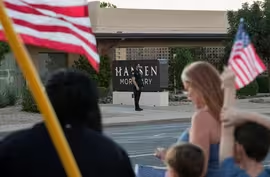
States face hard choices after big health care funding cuts
Clip: 9/13/2025 | 5m 29sVideo has Closed Captions
States face hard choices after major cuts to federal health care funding
The Trump administration is planning sweeping cuts to health care funding across the country. Some of those cuts have already taken effect, while others will roll out over the next few years. KFF Health News senior health policy correspondent Stephanie Armour joins Lisa Desjardins to discuss what this means for states, which will have to shoulder more of the costs of health programs.
Problems playing video? | Closed Captioning Feedback
Problems playing video? | Closed Captioning Feedback
Major corporate funding for the PBS News Hour is provided by BDO, BNSF, Consumer Cellular, American Cruise Lines, and Raymond James. Funding for the PBS NewsHour Weekend is provided by...

States face hard choices after big health care funding cuts
Clip: 9/13/2025 | 5m 29sVideo has Closed Captions
The Trump administration is planning sweeping cuts to health care funding across the country. Some of those cuts have already taken effect, while others will roll out over the next few years. KFF Health News senior health policy correspondent Stephanie Armour joins Lisa Desjardins to discuss what this means for states, which will have to shoulder more of the costs of health programs.
Problems playing video? | Closed Captioning Feedback
How to Watch PBS News Hour
PBS News Hour is available to stream on pbs.org and the free PBS App, available on iPhone, Apple TV, Android TV, Android smartphones, Amazon Fire TV, Amazon Fire Tablet, Roku, Samsung Smart TV, and Vizio.
Providing Support for PBS.org
Learn Moreabout PBS online sponsorshipLISA DESJARDINS: The Trump administration# is planning sweeping cuts to health care## funding across the country.
Some# of those federal funding cuts have## already taken effect.
Others will be# rolling out in the next few years as## President Trump's so called One Big# Beautiful Bill Act is implemented.
That law will reduce what the# federal government expects to## spend on Medicaid by more than# $900 billion over a decade.
KFF Health News looked at# what that means for states,## which will have to shoulder more# of the costs of health programs,## and they found they're being forced to make# tough choices about what they can afford.
Stephanie Armour is the senior health# policy correspondent at KFF News and## joins me now.
Stephanie, first of all,# help our viewers understand which of## these health cuts have already happened# and which ones are coming down the road?
STEPHANIE ARMOUR, KFF Health News: That's# actually a really important question because## states are grappling with what's already# happened.
They've already seen tens of## millions of dollars cut.
For example, the# Trump administration is clawing back about## $11 billion just in funding that was given to# states to help them cope with the pandemic.
And a number of states had earmarked# those funds for public health programs,## and now they're having to cut that.
Also what's looming is even more troubling for# states because it's about almost a trillion## dollars in reduced Medicaid spending is# coming in the next year or two.
So right## now you're seeing states grappling not only# with the cuts that are happening right now,## but what are they going to down the line.
LISA DESJARDINS: Your work has really looked# at the ups and downs across the country and## it varies by quite a lot.
By your analysis, for# example, Texas expects to lose some $40 billion## in Medicaid funding.
Delaware's already seen# almost 40 million in public health funds cuts.
What do you see as the most painful# decisions going on out there right now?
STEPHANIE ARMOUR: Yeah, I think what's really# hard for states right now is they were kind of## going through a good time financial,# and they gave a lot of tax breaks to## residents in their state.
That's# been something that's been going on## across the country.
So that's really# eaten into states revenue already.
So on top of the fact that revenues are kind of# down because of that, they're seeing the cuts## that have already happened, plus the cuts that are# coming.
And for some states, there's not much they## can do.
They don't have a lot of other resources,# so they're going to have to cut programs.
Other states are trying to do what they can to# kind of bulk up what still exists.
For example,## New Mexico, creating a trust fund to try to keep# Medicaid going like so it will be there for the## years to come.
But by and large, for states,# this is a really tough time.
And they're just## now kind of getting the sense of the scope# of how big these cuts are really going to be.
LISA DESJARDINS: You know, Republicans, when# they passed the Big Beautiful Bill Act into law,## they insisted that this was about trying# to stabilize the Medicaid system overall## and that it would not hurt the vulnerable.# We've done a lot of work on that on the show,## and that's a debate remains# to be seen what happens.
But how do states view that problem# potentially?
Are states worried about## more uninsured on their rolls, or do they# think this could make the system more stable?
STEPHANIE ARMOUR: Well, I think it's both.
I think# a number of states sort of welcome some of the## oversight in terms of, you know, cracking down# on fraud and abuse, that's certainly an issue.## But I think states right now they're having to# put into place a lot of bureaucracy for this.
Like, one of the things that's going to be# required under the Big Beautiful Bill Act## is a work requirement.
And for enrollees, this is# going to be a lot more bureaucracy and paperwork.## And there's a lot of concern that's what's# going to cause people to drop off the roles,## that they're just not going to be# able to contend with the paperwork,## which we saw earlier with some states# when they imposed work requirements.
So I think states are kind of## both ways.
In some ways they kind# of welcome the additional oversight,## but it's also going to be a big financial# conundrum for them right now just setting it up.
LISA DESJARDINS: This area of American# health care is really among the most## complex problems this country has, and# it's confusing to many people.
But can## you help people understand if you're not on# Medicaid, maybe if you don't have a direct## connection to these health programs.
Could# this still affect you, all of these cuts?
STEPHANIE ARMOUR: Absolutely.
The Congressional# Budget Office estimates we'll see more than 7## million people uninsured compared to what we# have now.
And that's a significant number.## And what happens when that occurs# is hospitals, for example, they're## still required under federal law to treat# anyone who comes in their emergency room,## but you're going to have more people# who don't have insurance coming in.
So what that's going to do is add to what they# call uncompensated care.
The hospitals are going## to have to cover this one way or another.# So what you'll see is premiums potentially## rising for everybody who has private insurance# or employer insurance to help make up that gap.
So it definitely is going to affect everyone,# regardless of whether they're on Medicaid or## another federal program.
This is something that's# across the board.
Everyone's going to feel this.
LISA DESJARDINS: Such important and# smart reporting.
Stephanie Armour,## thank you so much for joining us.
STEPHANIE ARMOUR: Oh, thank you.
'Downton Abbey' creator reflects on beloved historical drama
Video has Closed Captions
Clip: 9/13/2025 | 8m 19s | Downton Abbey creator Julian Fellowes reflects on beloved historical drama (8m 19s)
Extremism scholar on rhetoric’s role in political violence
Video has Closed Captions
Clip: 9/13/2025 | 6m 49s | Extremism scholar analyzes influence of rhetoric on political violence (6m 49s)
Providing Support for PBS.org
Learn Moreabout PBS online sponsorship
- News and Public Affairs

FRONTLINE is investigative journalism that questions, explains and changes our world.

- News and Public Affairs

Amanpour and Company features conversations with leaders and decision makers.












Support for PBS provided by:
Major corporate funding for the PBS News Hour is provided by BDO, BNSF, Consumer Cellular, American Cruise Lines, and Raymond James. Funding for the PBS NewsHour Weekend is provided by...

